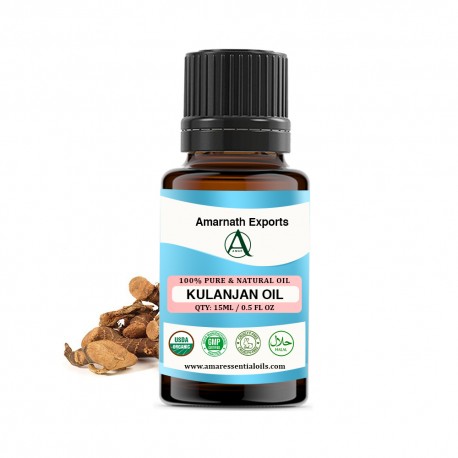No products
Product successfully added to your shopping cart
There are 0 items in your cart. There is 1 item in your cart.
kulanjan oil
New
Rooted in Ayurvedic tradition, Kulanjan Oil has its origins in the Indian subcontinent, where it has been revered for its medicinal properties for over 5000 years. The Kulanjan plant scientifically known as Alpinia galanga belongs to the ginger family and thrives in tropical regions. Its rhizomes, or underground stems, are rich in bioactive compounds that contribute to its therapeutic properties.
809 Items
More info
- Botanical Name: Alpinia galanga (Linn) Wild
- Family: Zingiberaceae
- Part Used: Dried Rhizome
- Origin: India
- Extraction Method: Steam Distillation
- Aroma: Spicy-campherous and Spicy-woody
- Major Constituents: camphene,3-pinene,1,8-cineole,alpha-pinene and camphor.
- Blends well with: Black pepper, Ginger, Rosewood, Pine, Ylang ylang, Clove, Cinnamon
Buy Kulanjan Oil | Alpinia galanga (Linn) Wild
Extracted from the roots of the kulanjan plant, also referred to as greater galangal and indigenous to Southeast Asia, kulanjan oil serves as a herbal extract widely employed in traditional medicine for diverse therapeutic applications. This herbal oil is renowned for its multifaceted therapeutic properties, addressing a spectrum of health concerns from digestive issues to headaches and arthritis. With its purported anti-inflammatory and analgesic attributes, kulanjan oil offers relief from pain and swelling, adding to its medicinal allure.
Beyond its medicinal applications, kulanjan oil finds a place in culinary realms, particularly in Indian and Southeast Asian cuisines. Its robust and aromatic profile, akin to the flavors of ginger and cardamom, lends depth and character to dishes, enriching the culinary experience.
Potency: Composition of Kulanjan Oil
What makes Kulanjan Oil so potent? It's all in the composition. This remarkable oil contains a diverse array of bioactive compounds, including galangin, galangol, and kaempferide, which exhibit powerful antioxidant, anti-inflammatory, and antimicrobial properties. Additionally, it is rich in essential oils such as cineol, methyl cinnamate, and eugenol, which contribute to its distinct aroma and therapeutic effects.
Benefits of Kulanjan Oil
Health benefits
Kulanjan oil is renowned for its numerous health benefits. It possesses anti-inflammatory properties that can help alleviate pain and reduce swelling. Additionally, it is believed to aid digestion and improve overall gastrointestinal health. Some studies suggest that Kulanjan oil may also have antimicrobial properties, making it effective against certain bacteria and fungi.
Skincare benefits
When applied topically, Kulanjan oil can work wonders for the skin. Its antibacterial and antifungal properties make it an excellent remedy for acne-prone skin, helping to clear blemishes and prevent breakouts. Furthermore, its moisturizing properties can hydrate the skin, leaving it soft and supple.
Haircare benefits
Kulanjan oil is a popular ingredient in haircare products due to its ability to promote hair growth and strengthen the hair follicles. Regular application of this oil can help reduce hair fall and prevent dandruff, resulting in healthier, more lustrous locks.
Anti-inflammatory
The potent anti-inflammatory properties of Kulanjan Oil make it a valuable ally in combating inflammatory conditions such as arthritis, rheumatism, and joint pain. It helps reduce inflammation, alleviate pain, and improve mobility.
Immune Boosting
Rich in antioxidants, Kulanjan Oil helps strengthen the immune system and protect against oxidative stress. Regular use may help reduce the risk of infections and support overall health and well-being.
Reviews
No customer comments for the moment.








